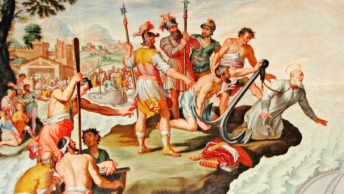The clock shines bright in the darkness of midnight. You remember to take deep breaths to stay calm. After some silence and mental prayer you glance at the clock. It is now 12:30am. You decide that you can try to fall back asleep. 1am. You are still awake and becoming restless. You get up and get some water and decide to lay back down. Maybe tonight will be the night you can fall back asleep. By 2am the restlessness intensifies. The eerie silence is maddening and painful. You consider praying the rosary. You start but it is too hard. You are too tired. Too warn out from all the sleepless nights. Around 5am you drift off to sleep for an hour. The alarm goes off at 6am and you groan as you begin your day. Another night of suffering. Another night of pain. Another night of feeling like God has forgotten you.
Insomnia and depression are just two of the culprits that can make our nights and days painful and intolerable. The mental and often physical anguish of insufficient sleep can foster a spiritual darkness that can feel hopelessly consuming. Insomnia and depression can seemingly cripple our connection to the Holy Spirit. The mental and physical challenges can make accessing spiritual comforts seem unachievable and hopeless. Despair so often can fill the soul on these nights, which then fills the days.
In these situations, addressing the physical and mental needs is important. But it is even more important to fight the spiritual battle. The devil uses mental health problems to attack our souls. It is so commonly said that God is never nearer to us than when we are suffering. As if this comfort can soothe the suffering soul at 2am when God could not feel farther away. Psalm 22 could not say it better, “My God, my God, why have you forsaken me? Why are you so far from saving me, and from the words of my groaning? Oh my God, I cry by day, but you do not answer, and by night, but I find no rest.” (v. 1-2).
For those that suffer from chronic depression and insomnia, the despair can be a constant companion. Where is God during these times? Why does he feel so far away? One adjective that is often used to describe God is “omnipresent.” In Latin, omnipraesens conveys that God is ever present, or always with us. So to answer the first question, God is present during the suffering. But as human beings with feelings, we want to feel that he is present. This can give us added assurance that we are not alone. God blessed us with emotions and feelings. But when we suffer from insomnia and depression, our feelings can lead us astray. It is erroneous to conclude that just because we do not feel God’s presence that he must have abandoned us. But this is so easy to conclude in the midst of the chronic pain and suffering. This conclusion is a temptation that must be fought against.
If we believe that God is omnipraesens, how can we endure the endless nights of feeling abandoned and spiritually impaired? The answer is laid out in Matthew 7:7, “Ask and it will be given to you, seek and you will find, knock and the door will be opened to you.” If we are asking for sleep or freedom from depression, we may not be granted those requests. What this passage asks of us is that we ask, seek, and knock for God. Saint Paul implores us in Romans 12:12, “Be patient in suffering, be constant in prayer.” So often we get caught up in asking, seeking, and knocking for our earthly needs to be met. For our mental or physical impairment to be alleviated. And then we get discouraged when after months or years of praying we are still suffering from that same impairment. Matthew 7:7 calls us to go beyond the physical and mental needs. Jesus is calling us to ask, seek, and knock after spiritual things.
So what can we do in the endless hours of the night or the endless days of depression? Well, we should be asking, seeking, and knocking, for spiritual growth and strength to endure our suffering. Hours of mental prayer is unrealistic for the majority of us, but there are many ways to pray. The Liturgy of the Hours (i.e. Divine Office) has a Night prayer and Office of Readings that can be prayed in the middle of the night. But it also provides a structure of prayer for the daytime hours. Experimenting with different kinds of prayer can make prayer more accessible. Pray lectio divina, Ignatian prayer, formulaic prayer, and silence. Find a rosary or prayer group. Pray with some favorite scripture verses. When the night passes, our seeking for God cannot end. Our seeking after God during the day may not stave off the endless hours of suffering in the night, but it will strengthen the soul and our resolve to endure the suffering. If we fill our souls up day after day we will grow stronger. We can learn to endure the endless physical and mental anguish when we fight the battle using the spiritual graces and sacraments to which we have access.
The darkness that insomnia, depression and other mental health disorders can create can be dark and persistent. It is fertile ground for despair, hopelessness, anger, and can leave us feeling abandoned by God. But when we find ourselves in this darkness, we must find the light. This light is the light of faith. This light does not always engender feelings of connection with God. But if we are reading the scriptures, attending Mass, praying, and dedicating ourselves to living holy lives, then the darkness of mental illness cannot prevail. We have to bring ourselves again and again back to the light of the Gospel. As persistent as insomnia and depression are, we must be even more persistent in returning to the light of faith.








